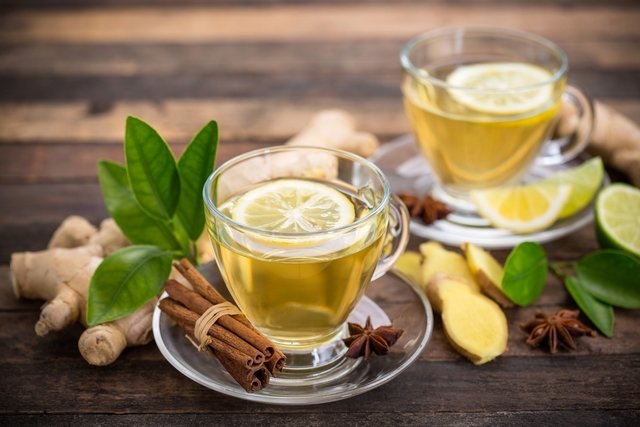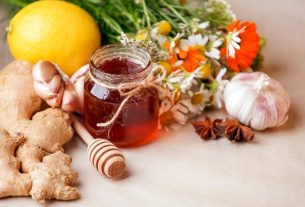Ginger tea is rich in substances capable of combating sore throats, colds and symptoms of poor digestion, such as nausea, colic and vomiting. Furthermore, as it is a potent antioxidant and anti-inflammatory, ginger tea also helps prevent some diseases such as cancer, diabetes and obesity.
Because it has a diuretic and thermogenic action, ginger tea also helps eliminate excess fluid from the body and promotes the burning of body fat, contributing to weight loss.
The tea can be prepared with fresh or powdered ginger, and consumed alone or with lemon, cinnamon, turmeric or nutmeg, making the drink more nutritious and tasty. However, to obtain the benefits, ginger tea must be part of a healthy and balanced diet, associated with regular physical activity. Learn more
Benefits of Ginger Tea
The main health benefits of ginger tea include:
1. Combat nausea and vomiting
Intake of ginger tea has an antiemetic action, improving symptoms of nausea and vomiting, and is also recommended to improve appetite and prevent weight loss in people undergoing chemotherapy.
2. Improve digestion
Because it has potent antioxidant activity, ginger tea protects and improves the functions of the liver and stomach, improving digestion and combating intestinal gas.
3. Promote weight loss
Ginger tea has a diuretic action, helping to eliminate excess body fluid. Furthermore, the drink is also thermogenic, which increases caloric expenditure and promotes fat burning, promoting weight loss.
To help with weight loss, it is recommended that ginger tea be consumed around 3 times a day, and should be part of a balanced and healthy diet and that physical activity be practiced on a regular basis.
4. Avoid diabetes
Because it is rich in antioxidants and anti-inflammatories, ginger tea helps improve the functions of insulin, the hormone responsible for controlling blood sugar levels, preventing insulin resistance and diabetes.
5. Prevent some types of cancer
Compounds such as gingerol and shogaol have anti-inflammatory and antioxidant effects, preventing damage caused by free radicals to cells. Therefore, ginger tea prevents some types of cancer, such as pancreas, skin, lung, stomach and colon.
6. Fight inflammation
Ginger tea contains anti-inflammatory compounds, which help combat problems such as arthritis, rheumatism and muscle pain.
7. Treat infections
As it has an antimicrobial effect, ginger tea is recommended to help in the home treatment of infections such as flu, colds, sore throat and bronchitis.
8. Detoxify the liver
Because it has anti-inflammatory and antioxidant properties, ginger tea protects and strengthens the liver, helping to eliminate free radicals and other toxins, such as the heavy metal mercury, from the body.
9. Prevent cardiovascular diseases
The flavonoids present in ginger tea improve the elasticity of arteries and blood circulation. Furthermore, these antioxidants prevent the formation of fatty plaques in the vessels, preventing diseases such as heart attack, atherosclerosis, high blood pressure and stroke.
How to make ginger tea
Ingredients:
- 2 to 3 cm of grated fresh ginger;
- 180 mL of water.
Another way to prepare the tea is by placing 1 tablespoon of powdered ginger in 1 liter of water.
Preparation mode:
Place the ingredients in a pan and let it boil for about 8 to 10 minutes. Turn off the heat, cover the pan and when it is warm, strain and then drink.
How to consume: It is recommended to drink ginger tea 3 times a day.
Recipes with ginger tea
See other easy and tasty recipes with ginger tea:
1. Ginger lemonade
For hotter days, a great option is ginger lemonade, a refreshing drink with low calories and rich in fiber and vitamin C. This combination helps to strengthen the immune system and improve mood and general well-being.
Ingredients:
- 1 liter of water;
- 4 lemons;
- 5 grams of grated or powdered ginger.
Preparation mode:
Squeeze the juice from the 4 lemons and add it to a jug with the water and ginger. Let it rest in the fridge for at least 30 minutes. Drink lemonade throughout the day, replacing 1 liter of water, for example.
2. Ginger tea with cinnamon
Drinking ginger tea with cinnamon helps reduce the accumulation of fat in the body. Furthermore, cinnamon also helps regulate sugar, lower cholesterol and triglycerides, and blood pressure.
Preparation mode: add the cinnamon to the water along with the ginger and place the infusion over medium heat, letting it boil for 5 to 10 minutes.
3. Ginger with turmeric
Ginger tea is a powerful anti-inflammatory and saffron is known as a powerful antioxidant, bringing several health benefits to this tea, such as improving the immune system, preventing premature aging and regulating hormone production.
Preparation mode: Add 1 piece of ginger to 500 ml of water and bring to a boil. When it boils, turn off the heat and add 2 teaspoons of turmeric, covering the container and letting the drink rest for 10 minutes before drinking.
4. Ginger juice with pineapple
Ginger and pineapple juice is a great option for hot days and to aid digestion. In addition to the digestive properties of ginger, pineapple has bromelain, an enzyme that helps in the digestion of proteins.
Preparation mode: To make the juice, blend the pineapple with one to two pieces of ginger and serve it chilled, without straining or adding sugar. You can also add mint and ice to make it tastier.
Possible side effects and contraindications
Ginger tea is contraindicated for people with gallstones, stomach irritation and high blood pressure. Likewise, it should not be consumed by people who have changes in blood circulation or who are being treated with anticoagulant medications, as it may increase the risk of bleeding, and it is not recommended for children under 6 years of age.
Although ginger is considered safe during pregnancy, it is important that its use is guided by a doctor, as there is still insufficient information regarding the maximum dosage considered safe.
Excessive intake of ginger tea can cause arrhythmias and, depending on the dose used, some people may experience stomach irritation, diarrhea, cramps, high blood pressure and dizziness.

Sign up for our newsletter and stay up to date with exclusive news
that can transform your routine!
Warning: Undefined array key "title" in /home/storelat/public_html/wp-content/plugins/link-whisper-premium/templates/frontend/related-posts.php on line 12
Warning: Undefined array key "title_tag" in /home/storelat/public_html/wp-content/plugins/link-whisper-premium/templates/frontend/related-posts.php on line 13




